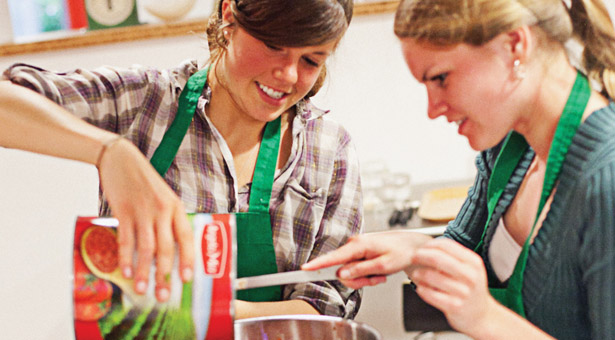Home & Family Improving Daily Life
Healthy, Fresh, Affordable
SPU Community Kitchen Creates Shared Meals With Neighbors
By Tracy Norlen (tcnorlen@spu.edu)

Students Heidi Laabs-Johnson (left) and Megan Lukens (right) prepare a homemade marinara sauce in the SPU food lab during a community kitchen event in May 2011.
A kitchen remodel in Seattle Pacific University’s Food Lab was the inspiration for a monthly meal
between neighbors and students.
The “Community Kitchen at SPU” is part of an international movement bringing together residents of diverse economic, social, and ethnic backgrounds to neighborhood community centers for cooking sessions. Community kitchens began in Peru in the 1960s in response to food shortages and are now opening in Seattle and beyond.
Associate Professor of Nutrition Daniela Geleva, who has been involved with community kitchens for a few years, said she knew the remodeled location in Peterson Hall would be a good fit. The new lab offers six cooking stations, complete with stove tops, ovens, and prep areas.
“I had wanted to start a community kitchen, but I never thought of starting it at SPU until the Food Lab was renovated,” says Geleva. “I had a conversation with my colleagues about how nice it would be to share the space with our community.” A grant from the SPU SERVE program provided the funds to start the program.
The monthly events began in April, and have usually included about 12 neighbors in search of affordable food and meal-planning skills. Participants pay a small cost to attend. The menu, planned by students majoring in food and nutritional science and prepared by everyone together, focuses on local, organic, and seasonal produce. After the three-hour cooking sessions, which include a shared meal, participants take leftovers home to their families.
Recent food and nutritional science graduate Tina Hayashi ’11 was the outreach and hospitality
team leader for the program. She says her experience with the community kitchen, and her work with the John Perkins Center’s Urban Involvement program fit together.
“I’ve learned the fundamentals of Christian community development. However, they are only effective through meaningful interactions with neighbors,” she says. “The principles are built
on relationships, and those relationships can blossom by cooking and sharing meals together.”
Heidi Laabs-Johnson, an SPU senior and student coordinator for the community kitchen, wrote a
recent blog post for the Community Kitchens Northwest website summarizing the get-togethers.
“The joy and gratitude that radiate from this group of people, both volunteers and participants alike, is tangible yet indescribable, and is referred to as almost-magical by community guests who have popped in.”
“Magical” is also a word Geleva uses to describe the dinners. “Producing this much food at home
would take a full weekend or a very long day, rather than a couple of hours,” she says. “It’s a perfect example of many hands making the load lighter.”
Jake Weber, director of the FamilyWorks Food Bank and Resource Center in Seattle, recently attended an SPU community kitchen with some of her clients. “The facilities were fabulous,
clean, and well equipped,” says Weber. “The three moms I brought said that they were excited
about trying out the recipes on their kids and how ‘there was nothing like this back in Somalia!’”
